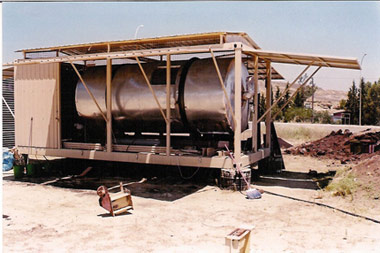FUNDING
Research program funded by the Cyprus Research Promotion Foundation. Code of program: ENISX/0504/17.
MAIN OBJECTIVES
The optimization of the rotary bio-drying process in a pilot scale batch bio-reactor. Assessment of various biodegradable waste treatment options for Cyprus
PARTNERS
– Isotech Ltd: host organization and coordinator
– Imperial College of London.
Technical support was provided by Vassiliko Cement Works Ltd under the coordination of the Energy Manager of Vassiliko.
KEY FEATURES
Mechanical biological treatment (MBT) is a well established practice in Europe for managing municipal solid waste (MSW). The process includes the treatment of the biodegradable fraction to produce compost-like output (CLO) or a stabilised residue destined for landfill disposal. Aerobic biological processes can also be configured to utilise metabolically generated heat to bio-dry the putrescible organic fraction and produce solid recovered fuel (SRF) with significant value as an alternative energy source to conventional fossil fuels in industrial situations, such as cement manufacture.
There is extensive information relevant to the control and optimisation of composting processes for BMW. However, few studies have considered the bio-drying of MSW and these were conducted at laboratory scale using static systems. Continuous or semi-continuous agitation and controlled aeration within a rotary drum, specifically configured and optimised for bio-drying, may provide an alternative approach and significant advantages compared to conventional, static methods of MBT by maximising microbial activity and heat generation at limiting moisture contents, reducing process retention times, enhancing particle size reduction and improving the homogeneity of the treated end product for use as a fuel.
This project was a detailed investigation of the rotary bio-drying process through a large number of bio-drying trials conducted with pilot rotary drum designed and owned by Isotech Ltd. The preparation of the research proposal and implementation of the project was undertaken by a PhD researcher under the supervision of an Associate Professor from Imperial College London. Technical support was provided by Vassiliko Cement Works Ltd under the coordination of the Energy Manager of Vassiliko.
RESULTS
The results of the project indicated that Solid Fuel Production with the bio-drying process and utilization of the fuel in Cement Kilns is an economically viable and practical alternative to landfill disposal. Biogas production through anaerobic digestion and stabilization of the digestate is another practical option for Cyprus. The results of the project also indicated that the bio-drying process has the ability to produce a suitable fuel for utilization in the Cement Kilns with less than 20 % moisture with a processing time less than 3 days. Temperature, agitation and pH control were the most important factors that should be controlled for optimum bio-drying.
